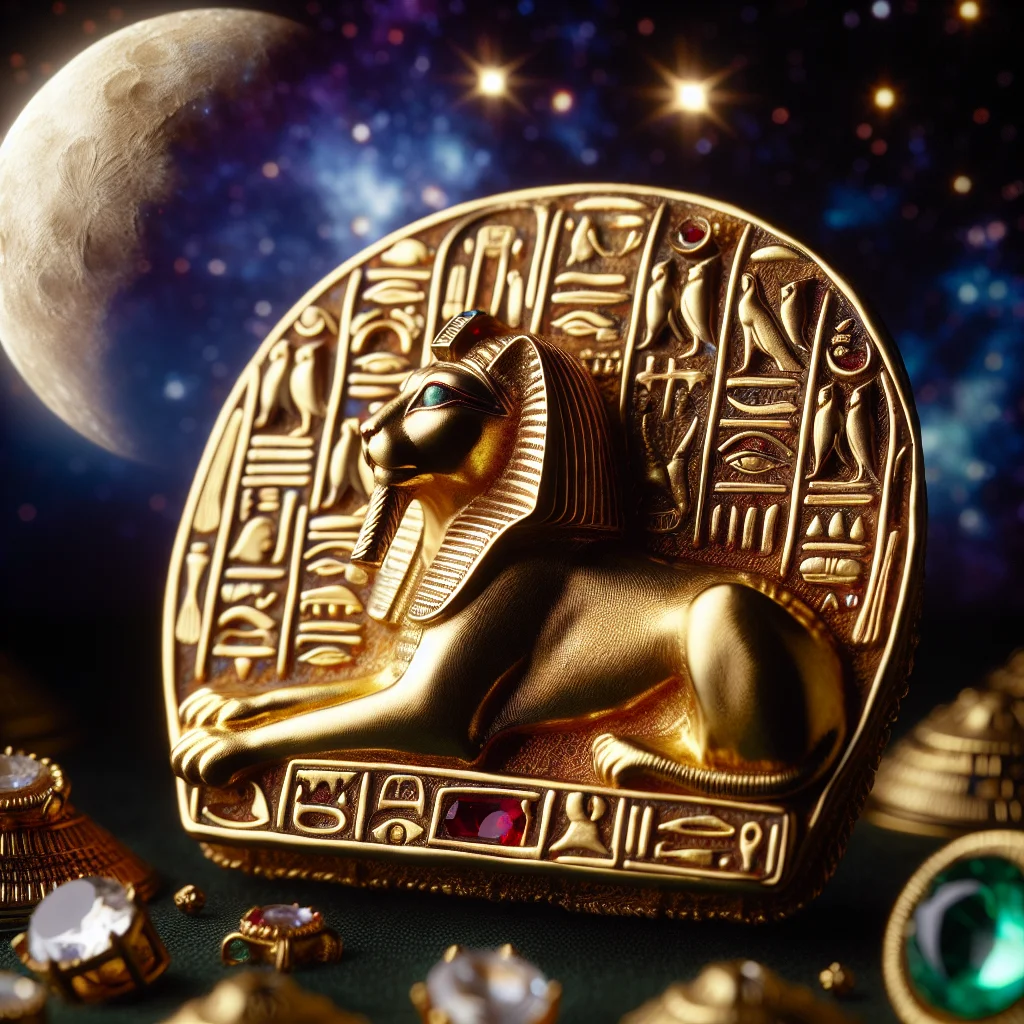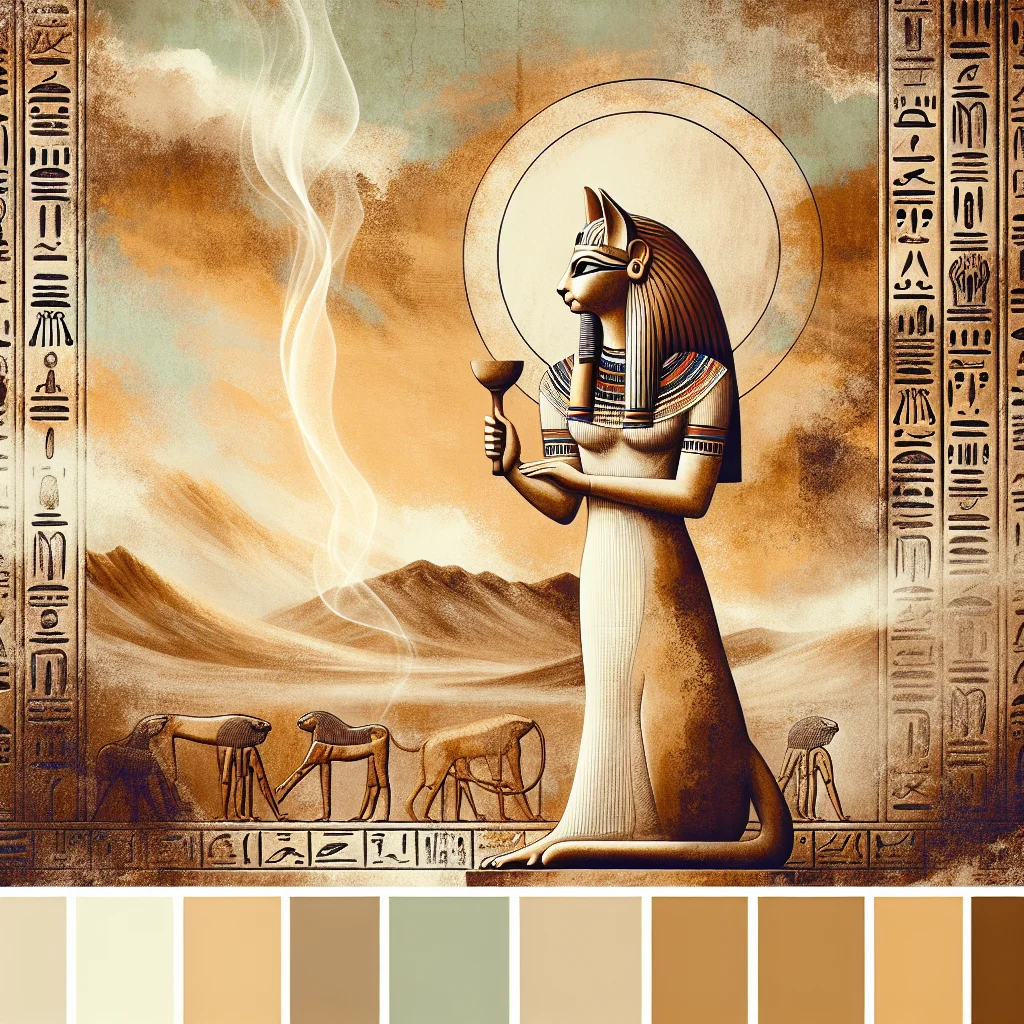As an Amazon Associate I earn from qualifying purchases.

In ancient Egypt, cats were revered as sacred creatures, and the deity Bastet, often depicted as a lioness or as a woman with the head of a lioness or domestic cat, was worshiped as the goddess of home, fertility, and childbirth, with a strong aspect of protector of the home and nation. Bastet, also known as Bast, was believed to embody the qualities of both the sun and the moon, exhibiting the dual nature of nurturing and protective as well as fierce and warlike.
Bastet’s worship can be traced back to the Second Dynasty (c. 2890 BCE), where she was originally a fierce lioness warrior deity of the sun throughout most of ancient Egyptian history, but later she was changed into the image of a domestic cat during the first millennium BC. Bastet thus became the goddess of protection, fertility, and motherhood. The center of her cult was in Bubastis in the Nile Delta. The city, now modern-day Tell Basta, held great festivities called “Feasts of Bubastis” that attracted devotees from all over the country to celebrate her honor.
By calling upon Bastet’s protective aspect, followers often sought safety from malevolent spirits or misfortune. The practice of invoking Bastet for protection extended beyond the realm of personal safety and into the protection of one’s home and family. Cats being natural predators of various vermin became symbols of safeguarding food and health, paralleling the manner in which Bastet guarded the greater societal order.
It is estimated that thousands of cat mummies have been discovered in Egypt, evidencing the high regard Egyptians held for the feline protectors linked to Bastet. People would offer mummies of cats as a tribute to Bastet, hoping to invoke her good graces. Additionally, amulets depicting her likeness were commonly worn and thought to serve as protectors in daily life, safeguarding individuals from both physical dangers and spiritual malevolence.
Today, Bastet’s influence continues as she remains a popular figure for those who are drawn to Egyptian mythology or practice various neo-pagan or occult traditions. Devotions to Bastet for protection might include setting up altars in her honor, using imagery or statues of cats, and performing rituals seeking her safeguarding powers. These modern incarnations of Bastet’s worship demonstrate the enduring legacy of this ancient deity and her association with protection and domestic harmony.
html
How Can a Bast Devotion Ritual Enhance Your Personal Protection?
The ancient Egyptian goddess Bast, also known as Bastet, is widely revered as a protector deity who embodies the attributes of safety, strength, and the nurturing of family and home. A devotion to Bast involves rituals and practices aimed at invoking her protective powers, which can manifest as an increased sense of security and well-being. These devotional acts typically include prayers, offerings, and the creation of sacred spaces in her honor. Such spiritual endeavors not only foster a deeper connection with divine energy but are believed to attract Bast’s favor and guardianship over one’s personal life. Employing rituals of protection inspired by Bast can be particularly beneficial in today’s world, where seeking inner peace and external safeguarding is a common pursuit. The layers of meaning and methods behind engaging with Bast for protection are elaborated in the ensuing sections, offering individuals guidance on how to harness the protective essence of this venerated feline goddess.
Bast Devotional for Protection
Bast, also known as Bastet, is an ancient Egyptian goddess who was originally a lioness warrior deity before evolving into the protector of home and family. As the daughter of the sun god Ra, her role shifted over time to encompass aspects of fertility and domesticity, which broadened her influence and reach in the everyday lives of ancient Egyptians. Today, people around the world continue to venerate Bast, seeking her protective guidance and blessings through various devotional practices.
To honor Bast and seek her protective embrace, many practitioners begin with creating a sacred space. It is common to establish an altar adorned with symbols associated with the goddess. Icons like statues or images of cats, an animal sacred to Bast, are central to such an altar. Furthermore, offerings of perfumes, fine oils, and incense are made to invoke the goddess’s presence, as she is said to appreciate fragrant offerings. Music and jingling bells may also be used during devotionals to echo the celebratory festivals once held in her honor in the city of Bubastis.
Another significant aspect of a Bast devotional for protection involves prayer and vocal invocations. Practitioners often recite hymns, chants, or prayers calling upon Bast to shield them from harm and to watch over their families. These may be drawn from ancient texts, or they might be personal prayers created by devotees that reflect their specific wishes and needs. It is believed that the very act of vocalizing devotion forms a deeper connection between the worshipper and the divine.
Meditation and visualization are tools used during a devotional to Bast. Devotees may meditate on the image of the goddess or on the protective aura they wish her to cast around their loved lives. They visualize her power as a force that can repel negativity and attract harmony and safety. Through such meditative practices, they seek to align their aura with Bast’s protective essence.
For some, a Bast devotional might include magical or ritualistic practices aimed at invoking protection. This could involve the creation of amulets or talismans that are charged with the intention of protection through rituals. Such items might be inscribed with symbols of Bast, carried on the person, or placed in strategic locations within the home.
In modern neopaganism, Sabbats, or seasonal celebrations, can integrate elements of Bast devotional to safeguard the home and family throughout the year. During these times, rituals connecting with the natural cycles provide an opportunity to renew protective intentions and cleanse any negative energies.
Community is also an important aspect of a devotional practice. Many choose to worship in groups, forming communities or covens that honor Bast together. Such gatherings can multiply the protective intentions, creating a collective shield of protection for all members involved.
It is worth mentioning that the veneration of Bast has seen a resurgence in contemporary spirituality, finding particularly strong resonance within the community of people who align with or practice various forms of paganism, Wicca, and general New Age spiritualism. The adaptations and interpretations of ancient practices enable modern devotees to connect with the goddess in a way that is both personal and reflective of traditional lore.
In conclusion, it’s interesting to note a modern-day statistic related to cat worship, a form of devotion to Bast, which underscores the continuing influence of the goddess in present times: according to a survey by the American Pet Products Association (APPA), cats are among the most popular pets in the United States, with almost 43 million households owning a cat in 2021. This not-so-surprising affinity for feline companions reflects just how deeply engrained the reverence for these animals—and by extension, Bast herself—remains in our collective consciousness.
1. Who is Bast in ancient Egyptian mythology?
Bast, also known as Bastet, is an ancient Egyptian goddess who was originally depicted as a lioness warrior. Over time, her image softened to that of a domestic cat. She is associated with protection, fertility, and the home, and is also considered the patroness of secrets, dance, music, and love.
2. What is a Bast devotional?
A Bast devotional is a set of practices, prayers, or rituals performed with the intent of honoring the goddess Bast and invoking her protective and nurturing qualities. It usually involves offerings, recitations, and personal reflections directed towards the deity.
3. How can I perform a Bast devotional for protection?
To perform a Bast devotional for protection, you can create an altar with symbols of the goddess, light candles, offer prayers or chants, and present offerings such as food or tokens that are significant to her symbolism. The intention is to request Bast’s safeguarding presence in your life or over your household.
4. What are common offerings made during a Bast devotional?
Common offerings during a Bast devotional include items that are pleasing to cats, such as catnip, milk or honey. Incense, such as myrrh or frankincense, can also be burned. Jewelry or amulets representing cats or lions may be offered, as well as figurines or images of Bast herself.
5. Are there specific prayers or incantations to recite for a Bast devotional?
Yes, there are specific prayers and incantations to Bast that can be recited during a devotional. These often involve appeals for protection, blessings, and guidance. Ancient hymns or modern interpretations can be used, and it is also acceptable to create your own personal prayers.
6. Do I need a special altar for Bast devotions?
While a special altar can enhance your devotional practices, it is not strictly necessary. You can dedicate a space in your home that includes representations of Bast and items related to her attributes. The key is that the space feels respectful and focused on your devotional activities.
7. Can Bast devotionals be part of a daily practice?
Yes, Bast devotionals can be incorporated into a daily spiritual practice. Many followers find that regular devotionals help strengthen their connection with the goddess and reinforce the protective energy in their lives.
8. Is it appropriate to ask Bast for protection over pets?
It is entirely appropriate to ask Bast for protection over pets, especially cats, given her historical association with felines. Devotees often pray to Bast to safeguard the health and well-being of their animal companions.
9. Are there any holidays or festivals dedicated to Bast where devotional practices are performed?
In Ancient Egypt, festivals such as the Feast of Bubastis were held in honor of Bast. Modern practitioners may choose to hold devotionals on dates that coincide with traditional Egyptian festivals or at times that feel significant to them.
10. Can anyone perform Bast devotional practices, or do you need to follow a particular path or tradition?
Bast devotional practices are inclusive and can be performed by anyone drawn to the goddess, regardless of their spiritual path or tradition. Respect for the deity and an understanding of her attributes are the most important aspects of these practices.

Conclusion
Focusing on the Bast Devotional for Protection, it’s evident that the rites and practices involved serve as a cornerstone for individuals seeking solace and safeguarding in their spiritual journey. By invoking Bast, the ancient Egyptian goddess of protection and cats, devotees are able to tap into her powerful energies, emphasizing the significance of connecting with divine entities for personal security and well-being. Through various forms of worship such as offerings, prayers, and meditations, individuals cultivate a relationship with Bast, harnessing her strength to shield them from spiritual and physical adversities. The practices discussed underline the enduring relevance of ancient traditions in contemporary spiritual life, spotlighting the timeless human quest for defense against the unseen forces.
Moreover, the devotional acts underscore the importance of intention and devotion in ritualistic practices. Whether setting up an altar, choosing appropriate offerings, or reciting protective chants, every action within the Bast Devotional framework is performed with a profound sense of purpose and respect for the deity. This aligns the practitioner’s energy with Bast’s, creating a powerful symbiotic exchange that fortifies the supplicant’s aura and environment. Insights from the article highlight the transformative potential of consistent and heartfelt worship, not only as a method of invoking divine protection but also as a pathway to spiritual growth and enlightenment, thereby reaffying the potency and relevance of Bast Devotionals in the realm of protective spirituality.
Amazon and the Amazon logo are trademarks of Amazon.com, Inc, or its affiliates.
Continue Your Magical Journey
Free Witchcraft Starter Kit
Get 6 free printable PDFs: grimoire pages, moon calendar, spells, crystals, herbs, and tarot journal.
We respect your privacy. Unsubscribe anytime.
Enhance Your Practice
As an Amazon Associate, I earn from qualifying purchases.

